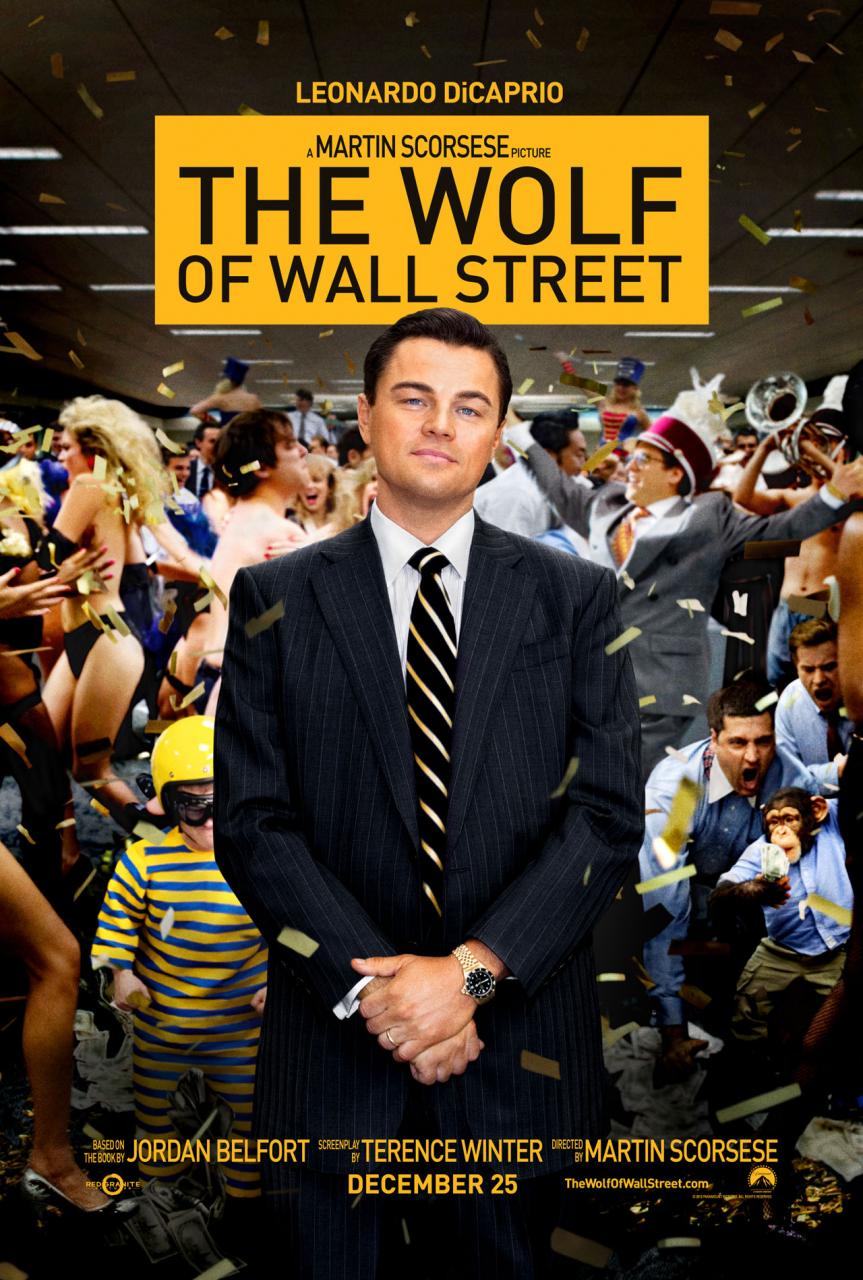Sometimes it’s not just what you watch, but how you watch it that matters. There’s a scene in the film Boiler Room when a group of Wall Street stockbrokers is watching Wall Street together, and they have all of Gordon Gekko’s lines memorized. They’re drinking beers and eating popcorn and having a general great time. In other words, Oliver Stone’s warning against the capitalistic excess of Wall Street, in the wrong hands, turned into a how-to video.
The trailer for The Wolf of Wall Street deserves an award in itself—it was hands down the best one of the year—and made the whole thing look like a madcap romp through the life of insanely rich dude Jordan Belfort. This assertion was backed up, in my mind, by the Golden Globes’ decision to nominate the film in the category of comedy rather than drama. True, the Globes historically have made some, um, interesting choices in their definition of what constitutes a comedy, so it’s not like I was expecting slapstick or anything. But there certainly are signals that go up for you, even subconsciously, when you’re being told how to receive a film, and I’ll say this: Wolf should not be viewed as a comedy.
Specifically, we should not be laughing alongside Jordan Belfort when he narrates his adventures. We should not see him as a cool guy, or someone to envy. We should not take solace in the ending, wherein (spoiler) he more or less lands on his feet (end spoiler). But the film basks in Jordan’s excess, perhaps because Martin Scorsese is himself a fan of excess. It’s surely why he was drawn to Howard Hughes, and definitely why he likes mobsters so much. Jordan is supposed to be charming, but I found him annoying. He spends an awful lot of time telling us about his stuff, look at my car! Look how hot my wife is! Look at this huge house! This would get tedious if Scorsese and DiCaprio weren’t such a fluid team by now, able to make even someone as insufferable as Belfort entertaining, if not sympathetic. But it is a bit disconcerting that the film, at times, seems like it actively agrees with Belfort’s outlook on the world. It kind of likes him. A lot.
Example: Scorsese, who’s usually such a meticulous director that he’s borderline obsessive compulsive in the cleanliness of his scenes (another reason he likes Hughes), is very messy here. Scenes drag on endlessly, as in the point when Jonah Hill improvises insults in a parking lot for what seems like a third of the film. Even the good sequences, like a delayed kick-in from some expired Quaaludes, ultimately add up to nothing, no stakes, and essentially could have been completely cut from the film without any damage to the structure. The only reason I can possibly think of that an anal-retentive director like Scorsese would make such a lapse in editing is that it’s not a lapse at all, but rather a deliberate plunge into the mind and sensibilities of a guy like Jordan Belfort.
This is where deciding how to watch the film comes in handy. Because if you look at the whole thing like a tragedy, the insane delusions of a solipsist, it takes on a sort of warped, deep sadness, and that makes all the difference. It helps to explain the excess, for one: Scorsese is editing the story of Jordan Belfort as Jordan Belfort himself would, so the mess becomes a commentary on how ridiculous Belfort’s worldview is. It helps to explain the absolutely horrendous treatment of women, not by the stockbrokers but by the film itself (the only real substantive female role is given to Margot Robbie as Jordan’s wife, and to say that she’s objectified is…an understatement). It makes the ending a lot easier to take, since we get to look at it as a man who won’t stop his idiocy, rather than a survivor and brilliant entrepreneur. It doesn’t, however, help to explain why Jordan Belfort deserves his own film, because he doesn’t add up to much.
DiCaprio, though, gives the performance of his career. He can’t play normal human beings (his weakest two roles were Titanic and Revolutionary Road), but he’s a great character actor, and he makes Belfort into quite a character. His comic timing is incredible, and he makes great choices, like putting ju-ust the right spin on a line like, “When I was 28, I made 49 million dollars—which really pissed me off, because it was three shy of a million a week” (though note, again, how a line like that, when viewed incorrectly, seems only to glorify and charm-ify Belfort). And there actually is a lot of slapstick, especially of the drug-related kind, which Scorsese has a knack for. Marty’s not happy until a first-class flight turns into a fist fight with everyone fake humping each other, and it does the film some wonders—though, again, this kind of forces us to look at it as a comedy, which brings up some problems (especially the women thing, especially, especially the women thing; “What do you think I did? I fucked the shit out of her,” says Belfort in voiceover, and that line got frankly concerning uproarious laughter in the theatre I was in).
But it looks great—the whole thing is like candy to look at—and it is, after all, Scorsese. So, I mean, see it of course. Just remember how to watch it. Unless you’re an asshole. In that case, it’s a comedy.
About Ted McLoof
Ted McLoof is a writer at Rookerville and teaches fiction at the University of Arizona. His work has appeared or is forthcoming in the Minnesota Review, Bellevue Literary Review, Gertrude, Monkeybicycle, Sonora Review, Hobart, DIAGRAM, The Associative Press, and elsewhere.He's recently been nominated for the Pushcart Prize and a Best of the Net Award. He is very cool and very handsome and he'd like to buy you a drink.

